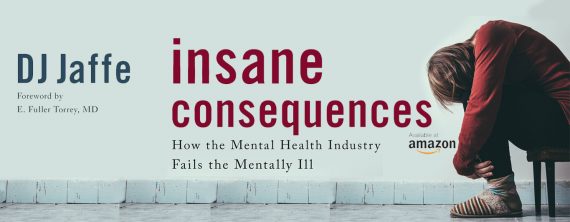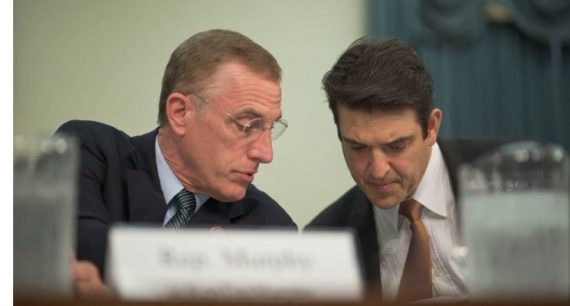 (5-1-17) Given the ongoing dispute about who will be the first Assistant Secretary for mental health and substance abuse, it seems a fitting time to discuss D.J. Jaffe’s new book, Insane Consequences: How the Mental Health Industry Fails The Mentally Ill.
(5-1-17) Given the ongoing dispute about who will be the first Assistant Secretary for mental health and substance abuse, it seems a fitting time to discuss D.J. Jaffe’s new book, Insane Consequences: How the Mental Health Industry Fails The Mentally Ill.
For the past thirty years, Jaffe has been deeply involved in advocating for better care for the seriously mentally ill and his book provides a roadmap for what he is convinced needs to be done to rescue and reform our current system.
Jaffe became an advocate because of a family member. In his case, it was his wife’s younger sister, Lynn. What happened to Jaffe, his wife, Rose, and to Lynn has become an all too common story.
She started becoming paranoid, convinced that conversations taking place across the street involved plots to kill her…We took her to the emergency room. She was admitted, diagnosed, medicated, and provided rehabilitative therapy. But to “protect her privacy,” her doctor wouldn’t tell us her diagnosis, what medication she’d given Lynn, or what would happen when her hospitalization ended. Lynn returned home to us and stopped taking the antipsychotic medications we didn’t even know she’d been prescribed…”
Thus, Jaffe was thrust into our baffling mental health care system which he quickly found to be both frustrating and lacking. Determined to help change it, he began by knocking on the door of the National Alliance on Mental Illness, raising money for its New York City chapter and eventually joining its board. From there, he moved to the Treatment Advocacy Center where he became a strong advocate for Assisted Outpatient Treatment and a dedicated admirer of Dr. E. Fuller Torrey, one of TAC’s founders. More recently, he has launched his own organization, Mental Illness Policy. Org, which he describes as “a nonpartisan think tank that creates detailed policy analyses for legislators, the media and advocates.”
It is his untiring work as a self-admitted policy wonk that has made him a favorite of reporters eager to have someone explain or react to the newest unintelligible legislation that is churning its way through either a state or federal legislative body. Most recently, he worked closely with Rep. Tim Murphy (R. Pa.) and his staff in developing the Helping Families In Mental Health Crisis Act, which is designed to shift federal dollars away from what often are called “wellness” programs and focus on “the seriously mentally ill.” But let’s allow him to explain:
“America’s mental health system is insane, expensive, and ineffective. Under the guise of protecting civil rights, it is killing people. Under the guise of increasing freedom, it is increasing incarceration. Under the guise of facilitating recovery, it ensures that fewer recover. In the name of protecting privacy, it causes suicide. America treats the least seriously ill (“the worried well”) and forces the most seriously ill to fend for themselves. The ability to get help has become inversely related to need. We move sick people from hospitals to jails and label it progress. Government funds those who create the problems rather than those with solutions. The more dysfunctional the system becomes, the more money we throw at it. Our mental health system is not based on science and has nothing to do with compassion. As a result, there are ten times more people with mental illness incarcerated as hospitalized. Being mentally ill has essentially become a crime.”







